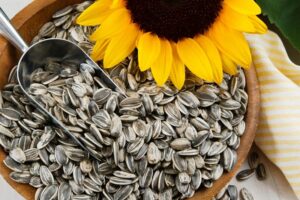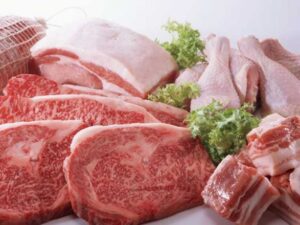
The agricultural holding Continental Farmers Group has completed threshing sunflower from 13 thousand hectares with a yield higher than planned and oil content of more than 50%, the press service of the agricultural holding reports.
“Although high temperatures during the flowering period somewhat reduced the expected potential of the crop in some regions, Continental still notes good quality of the harvested sunflower, its high oil content of more than 50% and yields above the target,” the statement said.
Currently, the agroholding has focused all its efforts on threshing soybeans, for which 46.5 thou hectares were allocated in the 2024 season. Both own and hired machinery are used to harvest the crop.
“We have started threshing corn only on a few areas where the moisture content is already at the basic level. This accelerated maturation of the crop was caused by a hot and dry August. However, we plan to start intensive corn harvesting in the second half of October in most fields. In total, we have 28.5 thou hectares of the crop to thresh,” explained Konstantin Shityuk, COO of Continental.
He noted that October will be the busiest period of the harvesting campaign for the agricultural holding. Weather conditions at the beginning of the month will largely determine whether the harvest season will be successful. Continental expects to complete the main field work on schedule and remains optimistic about crop yields.
The harvesting of sugar beet and potatoes continues on Continental’s fields, which this season occupy 3.2 thousand hectares and 1.8 thousand hectares respectively. For both crops, farmers are getting good intermediate results, with favorable weather conditions providing sufficient soil moisture for high-quality harvesting with minimal damage.
Mriya Agroholding and CFG, united under the name Continental Farmers Group, have been operating as a single business since November 2018, when Mriya entered into an agreement with international investor Salic UK to sell its assets.
Salic was founded in 2012. Its sole shareholder is the Saudi Arabian Public Investment Fund, which invests in agricultural and livestock production.

Chilled meat of all types continued to rise in price by an average of 1.9-3.3% in national retail chains in early fall, according to the Pig Producers of Ukraine (PPU).
“In September, there was a gradual increase in prices for chicken and beef, so the average price of these types of meat added 2% and 3.3% to the August figure. Although retail prices for pork changed direction during the month, the average price per kilogram for the analyzed period also showed an increase of 1.9% compared to August to 203.5 UAH/kg,” the analysts said.
At the same time, according to them, it is 2.1% more affordable than in September last year.
Experts noted that in September, unlike in previous periods, the thigh part went up by 4.6%, or almost 7.5 UAH/kg compared to August. The increase in prices for pork tenderloin did not exceed the average mark, but due to the higher price of this semi-finished product, it was more noticeable for the wallets of Ukrainian consumers (+4.8 UAH/kg). The rise in price of other pork products was limited to 3-4 UAH/kg.
Another difference in September was the inconsistency of changes in pork prices in purchases and on supermarket shelves.
“If in August the direction of movement of quotations in the pork market corresponded to the rise in price of slaughterhouse pigs, in early autumn the situation changed. Thus, in the first half of September, live pork prices dropped significantly, while retail prices continued to grow by inertia. At the same time, the reaction of store price tags to the positive correction of purchase prices was more rapid. While the average price of pork in supermarkets was 1.9% higher than in August, pig farms received 4.4% less per kilogram of live weight sold than in the previous month,” the industry association summarized.

Ukrainian one-dollar store chain Aurora has expanded its network to 25 stores and served more than 1 million customers in Romania over the past year, CEO Taras Panasenko said on Facebook.
“Exactly one year ago, the first store in Suceava opened its doors. Now we already have 25 stores here, and eight are in the pipeline to open soon. This year we have served more than 1 million customers in Romania (…), 98% of them are locals,” Panasenko said.
He noted that the segment in Romania is still far from being profitable, “because we need to scale up and fine-tune the product, but we are growing steadily, both quantitatively and qualitatively.”
At the same time, in Romania, Aurora’s NPS (Net Promoter Score), measured by an independent marketing agency, is even higher than in Ukraine, reaching 86.
“We are the first case in the history of independent Ukraine when a system retailer has successfully scaled to the EU. We support local Romanian and Ukrainian producers who export a lot of goods to Aurora Romania. This includes manufacturers from the frontline cities,” he said.
“Aurora was founded in 2011 by Lev Zhidenko, Taras Panasenko and Lesya Klymenko. The retail chain is headquartered in Poltava. The chain has 1528 stores in Ukraine and 25 in Romania.
According to Opendatabot, the owner of Vygidna Pokupka LLC, which develops the chain, is listed as Auroritail Investments Limited of Cyprus, with Zhydenko as its beneficiary. The Cypriot company also owns Prior Development LLC, Seven A LLC, Promyslova 9 LLC, and Tak LLC.
At the end of 2023, the network’s net profit amounted to UAH 4.1 billion, and net income – UAH 27 billion.

China’s foreign exchange reserves, the largest in the world, increased by 0.9% to $3 trillion 316.4 billion in September compared to $3 trillion 288.2 billion a month earlier, according to the country’s State Administration of Foreign Exchange (SAFE). They are at their highest level in 8.5 years (since December 2015), according to Trading Economics. At the same time, analysts surveyed by this publication predicted an average increase to $3.3 trillion.
In September, the yuan exchange rate rose by about 1.1% against the US national currency. Meanwhile, the US dollar fell by 1% against a basket of major world currencies.
China’s gold reserves amounted to 72.8 million ounces at the end of last month, SAFE also reported. The volume of precious metal reserves has remained at this level since April.
At the same time, in value terms, gold reserves increased to $191.47 billion from $182.98 billion at the end of August due to the rise in precious metal prices to a record level.

The volume of registrations of new commercial vehicles (trucks and special vehicles) in September 2024 increased by 6% compared to the same month in 2023, to 1068 thousand units, which is 1% (or 15 vehicles) less than in August this year, Ukravtoprom reported in its telegram channel.
According to the report, last month, Renault retained its leadership in the market with 280 units (in September 2023, it was the leader with 214 units), Ford took second place with 135 units (in September last year, the brand was third in the ranking with 98 units), and Citroen took third place with 101 units (12th place with 33 units).
The top five also includes MAN (79 units) and Scania (66 units), which in September last year respectively occupied the sixth (60 units) and second (106 units) lines of the rating.
According to Ukravtoprom, in January-September, more than 9.3 thousand new trucks were added to the Ukrainian fleet of trucks and special vehicles, which is 15% more than in the same period last year.
At the same time, AUTO-Consulting, an information and analytical group, analyzing the segment of trucks with a gross vehicle weight of more than 3.5 tons in September, notes its “strong growth” in contrast to the passenger car market.
“Dealers managed to improve their sales by 20% year-on-year. Therefore, the heavy equipment market has entered the new business season with good dynamics,” the group’s website states.
The leader was MAN with a 75% increase in sales, followed by Ford, which increased sales by 43%, and Scania, which slightly reduced sales in September.
Analysts note an increase in sales of Renault trucks by almost 2.7 times, Iveco – by 40%.
According to AUTO-Consulting, the truck market grew by 10% in January-September and “overcame the crisis.”
“The number of special vehicles produced by Ukrainian companies is unprecedented. And if the program to reimburse 15% of the cost of wheeled vehicles with Ukrainian localization is launched, it will contribute to further growth,” the report states.
As reported, in 2023, according to Ukravtoprom, the volume of new commercial vehicle registrations in Ukraine increased by 65% compared to 2022 – up to 11.3 thousand units. At the same time, the segment of trucks over 3.5 tons, according to AUTO-Consulting, increased by 56.5% to 4853 units.

The Netherlands has officially delivered the first F-16 fighter jets to Ukraine, Dutch Defense Minister Ruben Brekelmans has announced.
“For the first time I can officially announce that the first Dutch F-16s have been delivered to Ukraine. This is extremely necessary. In Kharkiv, I saw the destruction caused by Russian air strikes and heard frequent air raids. The rest of the 24 planes will be delivered in the coming months,” Minister wrote on the social network X.